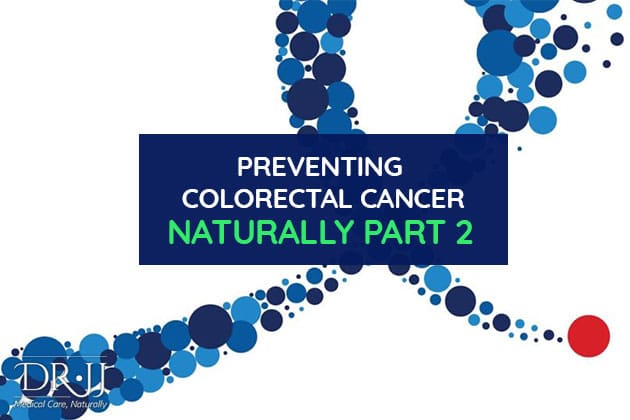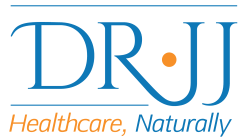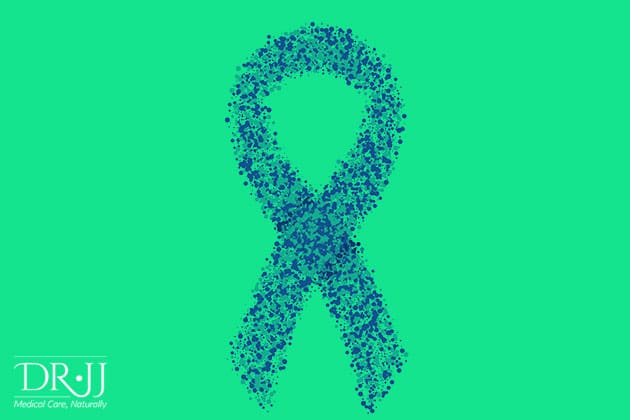
If you haven’t yet had a chance, be sure to read Preventing Colorectal Cancer Naturally Part 1, as it will give you a good overview of colorectal cancer, and some of the symptoms, factors, and risks.
As a general summary, colorectal cancer is a type of cancer where cancerous cells grow in your colon (large intestine), or your rectum.
In this second of a two-part series, I’d like to dive down into some of the ways you can naturally prevent colorectal cancer, and the Dr. JJ cancer prevention approach post-cancer recovery.
Natural Ways To Prevent Colorectal Cancer
Living a healthy lifestyle has been shown to reduce the risk of many illnesses and diseases, and colorectal cancer is no different.
To get you started, here are my top ten recommendations for preventing colorectal cancer naturally:
1. Eat A Healthy Diet
It’s important not just to increase your fruit and veggie intake, but to also reduce the amount of red meat and processed meats that you eat.
It’s also a good idea to choose the fruit and veggies that can optimize your health.
Some fruits and veggies contain zinc, probiotics, and vitamin b6, which can help you maintain your overall health, and may reduce your risk of cancer.
The issue with meat, specifically, is that when you cook it at high temperatures (through barbecuing, frying, or broiling), it creates cancer-causing chemicals called HCAs and PAHs.
These are among some of the common toxins that can be found in your body.
Instead, turn to high fiber foods to feel full, such as whole grains and legumes (beans, peas and lentils).
These foods also happen to be very good for your digestive health, which can help you prevent the development of colorectal cancer.
There have been a number of studies done on different foods and beverages, which have been shown to reduce the risk of colon cancer.
These include coffee, broccoli, olive oil, flax seeds, garlic, tomatoes, and turmeric.
On top of that, there is evidence that magnesium-rich foods, such as avocados, bananas, raspberries, salmon, tuna, and dark chocolate, can help reduce your risk of colon cancer.
There are numerous different types of vitamins out that may be beneficial for your health.
Consult with a naturopathic doctor to determine which vitamins may be right for you.
2. Get Some Exercise
Exercise is recommended for everyone, in some way, shape, or form.
There are 3 main benefits from this recommendation.
1. If your lifestyle requires you to sit for long periods of time, this is a risk factor for colorectal cancer, so remember to take breaks, get up, and move.
If you plan on taking part in sports to reduce your risk of colorectal cancer, you may want to read up on my naturopathic approach to sports nutrition for some insights on how to fuel your body.
2. Obesity is a risk factor for colorectal cancer.
Maintaining a healthy weight allows your body to function optimally, and be able to best fight off cancerous cells, or better endure cancer therapies, if they’re necessary.
Obesity can also increase your risk for non-alcoholic fatty liver disease, and diabetes, which are risks factors for developing cancer.
So, it’s important to maintain a healthy weight to further aid in preventing the development of cancer, and other conditions that can increase your risk of developing cancer.
3. Exercise itself lends to a strong cardiovascular system, which is a foundation of physical health and should be incorporated into your lifestyle, if you haven’t done so.
3. Vitamin C Intravenous Infusion
Vitamin C can be used to help inhibit tumor growth and metastasis by inhibiting the enzymes they need to multiply.
It’s also suspected to promote collagen formation, which can help stabilize the tumor.
Some trials show excellent results for treating cancer patients with vitamin C infusions.
Although we’re still waiting on the final results, it’s becoming more common as a complementary therapy.
4. Limit Your Alcohol Intake
Alcohol, despite all the articles your friends share on Facebook that say a glass of wine a day is good for you, increases your risk of developing several diseases, including colorectal cancer.
In the case of alcohol, the less you consume, the better you will be in reducing your risk of colorectal cancer.
The recommended daily alcohol intake maximum is one drink for women and two drinks for men.
RELATED: Natural Hangover Solutions
5. Quit Smoking
We have known for over 50 years now that smoking and second-hand smoke can cause lung cancer, emphysema, and a host of other health problems.
However, tobacco smoke also can increase your chances of getting colorectal cancer, so if you know you’re predisposed, or have a history of it, it’s a good time to seek help quitting.
Tobacco contains numerous toxins that have serious health consequences, and increases your risk not just for cancer but other health issues as well.
6. Supplement With Calcium
A 2017 study by Veetil et. al. examined the effects of calcium supplementation on colorectal cancer.
Though they said the evidence is inconclusive, and they called for more trials to be conducted, they did say the possibilities are promising.
Other than through supplements, you can increase your calcium intake through dairy products, beans, lentils, poppy, sesame, and chia seeds, sardines, almonds, rhubarb, and whey protein.
7. Supplement With Magnesium
I already mentioned magnesium above as beneficial for preventing colorectal cancer.
Here is another study.
In 2012, Chen, Pang, and Liu conducted a study of magnesium intake and its effects on colorectal cancer.
Until then, studies have suggested a correlation but findings had been inconsistent.
After gathering eight different studies examining more than 300,000 people, they found that a higher intake of magnesium can reduce the risk of colorectal cancer.
You can increase your magnesium intake through supplementation or through avocados, raspberries, bananas, tuna, salmon, and dark chocolate.
8. Supplement With Omega 3 Oils
While not necessarily a preventative measure, omega 3 oils have been found to delay the growth of tumors when used alongside chemotherapy.
In 2016, Camargo et. al. conducted a study looking at patients during and after chemotherapy during the first 9 weeks of treatment.
One group was given fish oil supplements, while the other received none.
At the end of the study, they found it took significantly longer for tumors to advance in the group that had taken fish oil.
They hypothesized this could be a result of the oil’s enhancement of the antineoplastic of the chemotherapy process, though more tests need to be conducted.
Omega 3 fish oils are commonly supplemented, but you can get them in your diet.
You can get Omega 3 fish oils from cold-water fish like salmon, tuna, and sardines, flaxseed, chia seeds, walnuts, and certain fortified foods like eggs, milk, and nut-derived milk.
9. Supplement with Curcumin
Curcumin is the active ingredient in the spice turmeric that gives it its anti-inflammatory and antineoplastic properties.
In 2011, a study by Carroll et. al examined the effects of taking curcumin orally on forty-one smokers with signs of aberrant crypt foci, associated with colorectal cancer.
After taking a measured amount of curcumin for 30 days, they found that the number of aberrant crypt foci had decreased by 40%, a significant reduction.
As mentioned, you can get curcumin in your diet through turmeric, or through eating mango ginger, a close relative of turmeric, but it has a poor absorption rate.
Eating turmeric with black pepper may increase this absorption rate because of its active ingredient, piperine, according to a 2013 study by Gupta, Patchva, and Aggarwal.
You can also supplement with curcumin.
10. Supplement With Vitamin D
Vitamin D is a substance that helps you strengthen your bones and teeth, along with calcium and phosphorus.
According to the National Cancer Institute, a higher intake of vitamin D has been associated with a decreased risk of colorectal cancer.
It may also help decrease your risk of other cancers, such as breast, prostate, and pancreatic cancer.
They do admit, however, that it’s hard to account for the absorption of vitamin D through the skin, which makes clinical trials difficult.
The most common way for you to get vitamin D is through sun absorption, though it’s produced quicker above 25 degrees, which makes it difficult for most Canadians to get enough year-round.
Supplementing is a good idea for most people.
Questions? Ask Dr. JJ
Cancer is a challenge that you don’t have to endure alone.
While conventional medicine is currently the best option for primary cancer treatment, having a naturopathic doctor as part of your team may help ease the process.
Naturopathic medicine can also help as an adjunct to chemotherapy and radiation treatments.
Do you have a family history of colorectal cancer, or are you already being screened regularly?
Have you been diagnosed, or are you undergoing treatment for colorectal cancer?
If so, please contact me to set up a consultation so that I can help you achieve the very best possible outcome.
Book your appointment with me, Dr. JJ, today.
If you have questions about naturopathic medicine, or you’d like to take your first step into the world of naturopathy, contact me, Dr. JJ, and let’s book an appointment.
Yours in health,
Dr. JJ Dugoua, Naturopathic Doctor
600 Sherbourne St, Suite 315,
Toronto, ON M4X 1W4
-https://goo.gl/maps/6VDXwiCihRpDRo5A9
Dr. JJ Dugoua is a naturopathic doctor in Toronto and has a PhD in Pharmaceutical Sciences. His clinic provides solutions for many health concerns and has a special focus on thyroid health issues.



